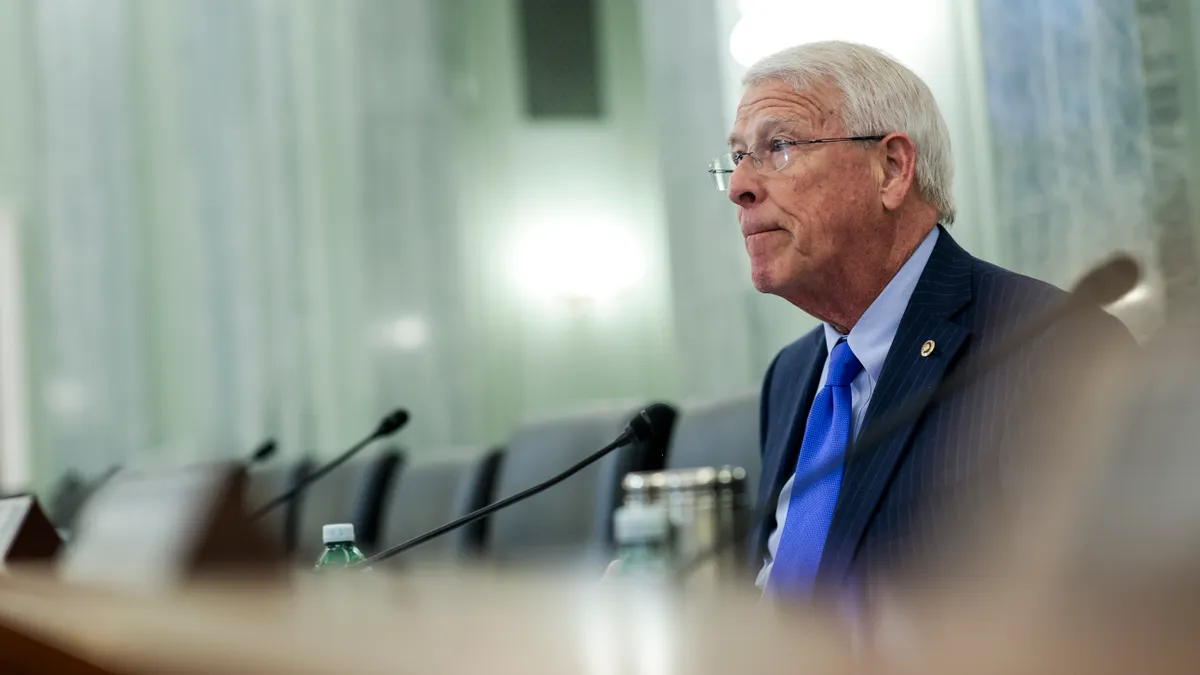Dive Brief:
- Missouri Sen. Roger Wicker withdrew his endorsement Tuesday for a GOP-backed bill that would impose a fee on carbon-intensive imports from countries with higher emissions than the U.S. and lenient environmental standards, with additional focus on China and Russia.
- The Republican lawmaker removed his name from the Foreign Pollution Fee Act of 2023 less than a week after Louisiana Sen. Bill Cassidy introduced it last Thursday. The legislation was initially backed by a trio of Republican senators: Cassidy, Wicker and South Carolina Sen. Lindsey Graham. However, Wicker’s name has since been scrubbed from the bill’s announcement.
- The bill’s introduction marks the first time formal climate risk-related legislation has been put forward by the GOP, signaling growing bipartisan support for curbing carbon emissions by penalizing carbon-intensive imports.
Dive Insight:
The Foreign Pollution Fee Act aims to “address the nexus between energy, economic development, supply chains, national security, and the environment at the expense of China and Russia,” according to a statement from Cassidy’s office.
The foreign pollution fee mentioned in the bill would ensure the pollution intensity of products imported into the U.S. is no “dirtier” than similar domestically produced goods and would penalize foreign countries, especially China, who “willfully ignore environmental standards and international norms to undercut manufacturing.” Though the fee amount isn’t specified in the bill, the document states it to be a “variable charge” based on a tier system that establishes the difference in pollution between a foreign country and the U.S.
The fee will be applicable to imported energy products such as natural gas, oil, hydrogen, minerals, solar panels and wind turbines. Industrial products like aluminum, cement, glass, iron, steel, petrochemicals and paper will also be considered as covered products.
Wicker’s departure was first reported by Semafor, who said the senator had expressed interest in an earlier version of the bill that offered protection to American manufacturers, but “decided upon further review of the final text that he could not ultimately cosponsor the legislation.”
Before the Missouri senator withdrew his support, he said he thought the bill was a favorable measure for U.S.-based manufacturers, especially when it came to matching domestic production costs with those of international competitors.
“American manufacturers should not be put at a strategic disadvantage because of our world-leading efforts to improve our manufacturing processes,” Wicker said in a statement at the time, adding that it was “high time to level the playing field and put the focus on holding our international competitors to the same standards.”
Wicker’s office did not immediately respond to a request for comment as of press time.
Despite the bill having bipartisan support overall, it has received its fair share of criticism already. The Cato Institute, a libertarian think tank, said Cassidy’s proposed legislation would ultimately encourage the introduction of a domestic carbon tax — a measure members of the GOP have historically lobbied against. Cato also said taxing imports would hurt American consumers as it would increase the purchase price of those goods, especially those domestic manufacturers who use imported steel in their manufacturing process.
The introduction of carbon tariffs on imports has gained popularity across the globe recently, with the European Union launching its own carbon border adjustment mechanism called CBAM in October this year. The commission said CBAM will put a “fair price on the carbon emitted during the production of carbon intensive goods that are entering the EU” and encourage cleaner industrial production in non-EU countries.
The policy would go into effect as early as 2026 and could impact U.S. based companies as well.










